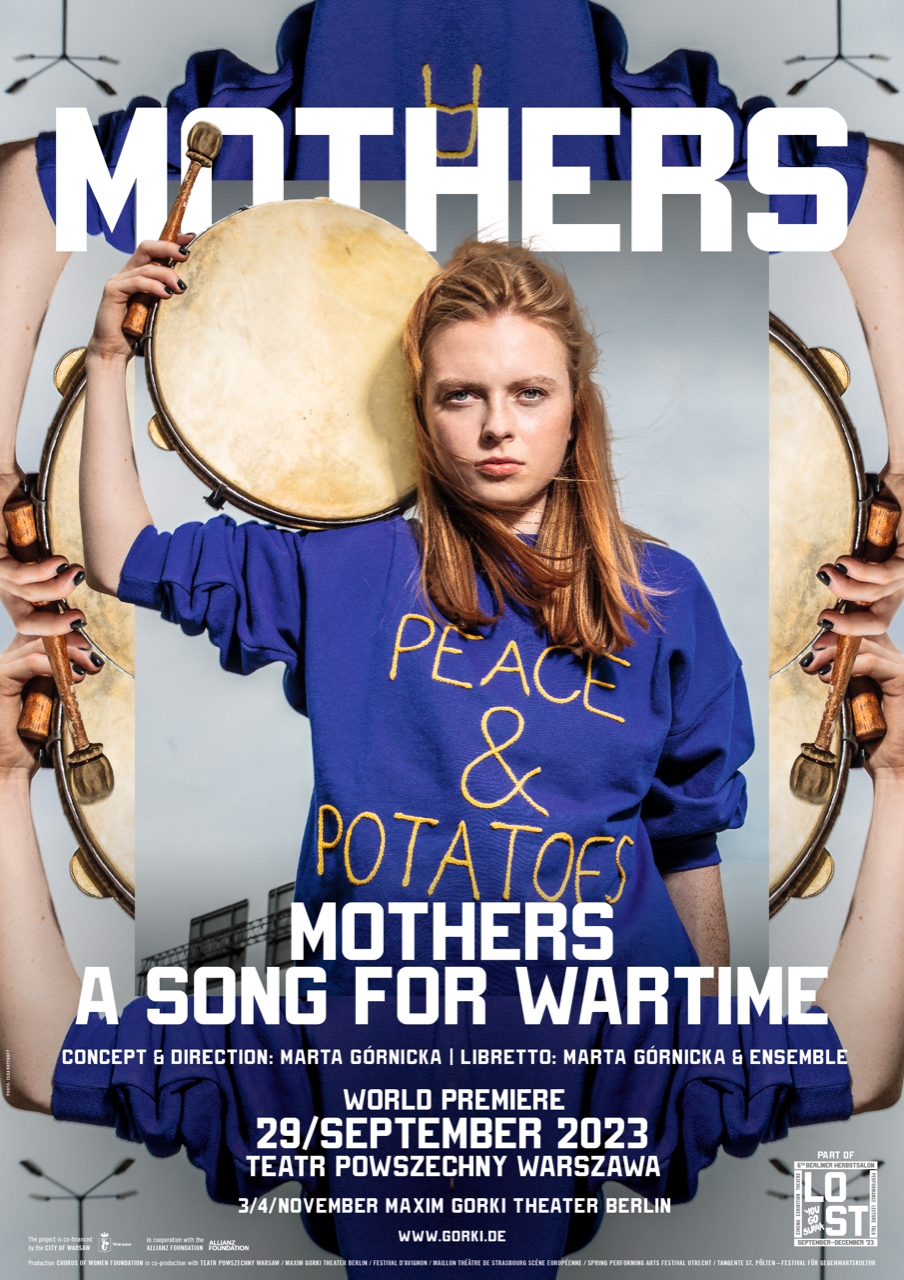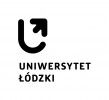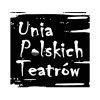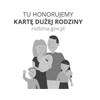Mothers. A Song for Wartime
Production: The Chorus of Women Foundation (Warsaw) and The Maxim Gorki Theater (Berlin)
Co-production: Powszechny Theatre in Warsaw; Festival d’Avignon; Maillon Théâtre De Strasbourg – Scène européenne; Spring Performing Arts Festival (Utrecht), Tangente St. Pölten – Festival Für Gegenwartskultur (Austria)
Conception and direction: Marta Górnicka
Text: Marta Górnicka; Ukrainian-Byelorussian-Polish team
Music: Wojciech Frycz, Marta Górnicka, traditional Ukrainian, Byelorussian and Polish music, excerpt from „Shchedrivka” by Mikolaj Leontowicz
Choreography: Evelin Facchini
Stage design: Robert Rumas
Costumes: Joanna Załęska
Dramaturgy co-operation: Olga Byrska, Maria Jasińska
Video: Michał Rumas, Justyna Orłowska
Projections: Michał Jankowski
Light: Artur Sienicki
Vocal preparation: Joanna Piech-Sławecka
Stage manager and assistant to the director: Bazhena Shamovich
Assistant to the choreographer: Maria Bijak
A performance of 21 Ukrainian, Polish, Belarussian mothers and their children. The cast comprises women aged 9 to 72, each with her unique political experience and a different life story; some are survivors from Mariupol, Kyiv, Irpin and Kharkiv. Those who have fled war, those who have fled persecution use the power of their voices to name something that cannot be put into words. Based on a traditional Ukrainian ritual singing they they look for a new ritual choir song. Their song is an accusation, a request and a warning for us and for all people in Europe.
„Our spectacle tells about women and war.
About defense mechanisms, about responsibility,
About our reaction to the war in Europe.
About rituals of war violence against women and civilians,
which are still the same”.
The war rituals of violence against women never change.?War raises questions for Europe: about accountability in the face of a threat and the mechanisms of its defence.?Out of the testimonies of Ukrainian, Belarusian and Polish mothers and children, those who have fled war and persecution as well as those who have welcomed them in Polish homes, Marta Górnicka, director, initiator of the Chorus of Women and the founder of the Political Voice Institute at The Maxim Gorki Theater in Berlin, creates a choral performance with her cast. The cast comprises 21 Ukrainian, Polish and Belarusian women aged 9 to 72, each with her unique political experience and a different life story. This chorus seeks a new post-operatic choral voice that draws from the female chori of the seventh century BC.
The performance opens with a shchedrivka – a traditional Ukrainian song, a well-wish for happiness and rebirth. These date back to pre-Christian times and are likely to be thousands of years old. The ritual of singing a shchedrivka was performed by women only, or by women and children. It was always addressed to a particular person. People believed in the power of the song, trusting that its words and the well-wishes would surely come true. Today, these sung wishes are addressed to all people, for a new time; for their entire life.
„In the past, the chorus was intended to sanctify the uniqueness of life, to serve a rebirth, a renewal. It was an opposite force to the force of annihilation. This performance will draw on that life force” (Marta Górnicka)
- “Human greatness against the brutality of war. This evening is a choral tale from the strength of the individual, which tells of dark violence and ends in bright humanity.” – a review by Doris Meierhenrich in “Berliner Zeitung” (“Marta Górnicka’s miracle weapon against the war in the Berlin Maxim Gorki Theatre.”)
- “This hour is an eternity and overwhelming dread. You have seen and experienced things for which there are no words. About which they speak and sing here, together, in a clear and strict form. With an attitude that moves and shocks” (a review by Rüdiger Schaper in „Der Tagesspiegel”)
The spectacle is performed in Polish, Ukrainian and Byelorussian with English subtitles.
Project partners: The Gustaw Holoubek Dramatyczny Theatre in Warsaw; Nowy Theatre in Warsaw; Ukrainian Institute; Foundation for Freedom in Warsaw (independent non-profit public organisation focused on migrants from Ukraine, Chechnya, Belarus, Tajikistan and other countries who settled in Warsaw); „Przystanek Świetlica” („Bus Stop: Community Centre, day room for children and youth of migrants); Solidarity Community Centre „Słonecznik” (community centre of Ukrainian artists in Warsaw).
The project was co-financed by the City of Warsaw
Workshops, translations, consultations:
Movement workshops: Krystyna Lama Szydłowska
Ukrainian translation of the script: Olesya Mamchych
Byelarussian translation of the script: Maria Pushkina
English translation of the script: Aleksandra Paszkowska
Consultation on Ukrainian ethnomusicology: Anna Ohrimchuk
Consultation on Ukrainian children games: Venera Ibragimova
Translation during rehearsals: Marharyta Huretskaya

Tickets
150 zloties, reduced: 90 zloties
Duration
1 hour (without intermission)
When we play















































